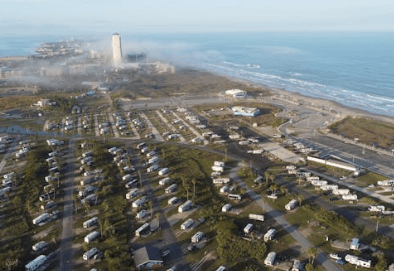The RV industry has grown rapidly in recent years, with over 11.2 million U.S. households now owning an RV, according to the RV Industry Association. As more people embrace the freedom of RV living, the demand to find RV lots for sale has increased dramatically, creating both opportunities and challenges for buyers. Whether you’re planning to live full-time in your RV or need a seasonal spot to park your home on wheels, finding the right lot requires careful research and planning. The process can feel overwhelming, especially with lot prices varying widely from $20,000 to over $200,000 depending on location, amenities, and local regulations. This detailed buyer’s guide will guide you through every step needed to find RV lots for sale, from understanding zoning laws to evaluating potential investments. Experienced professionals can help you find the right property at the right price in today’s challenging market. Steve Daria and Joleigh, renowned real estate investors and cash land buyers, have helped countless RV enthusiasts find their ideal lots while avoiding costly mistakes. Looking for the perfect RV lot? Book a free consultation today and let Steve Daria and Joleigh help you find and secure the perfect property for your RV lifestyle. Whether you’re purchasing for personal enjoyment or as an investment, we’re here to help you make the right choice.
Key Points
- Research Local Zoning Laws and Regulations: Before searching for properties, check local zoning laws to make sure RV living is allowed in the area you’re considering. Many municipalities have specific rules about full-time RV residence, parking duration limits, and required permits that could affect your investment.
- Consider Essential Utilities and Infrastructure: Look for lots that already have water, sewer, and electrical hookups, as installing these services later can cost thousands of dollars. Also, verify that internet connectivity and cell phone coverage are adequate for your needs, especially if you plan to work remotely from your RV.
- Evaluate Location and Accessibility: Select a location that balances your lifestyle preferences with practical considerations, such as proximity to healthcare, shopping, and emergency services. Ensure the lot has proper road access year-round and can accommodate your RV’s size and weight without causing damage to the property.
- Set a Realistic Budget Including Hidden Costs: Don’t forget about extra costs like property taxes, HOA fees, utility hookups, and regular maintenance expenses beyond the purchase price. Many buyers underestimate these ongoing expenses, which can add $200 to $ 500 per month to your total cost of ownership.
- Work with Experienced Real Estate Professionals: Work with agents or investors who specialize in RV lots and understand the specific challenges of this market. Experienced professionals can help you spot issues, negotiate better deals, and avoid expensive mistakes that many first-time RV lot buyers make.
What are RV lots, and why do people buy them?
RV lots are pieces of land specifically designed for parking and setting up recreational vehicles, such as travel trailers, motorhomes, and fifth wheels.
These lots typically come with essential utilities, such as water, sewer, and electrical hookups, making it easy to connect your RV and live comfortably.
People buy RV lots for several reasons, including having a permanent place to park their RV, creating a seasonal vacation spot, or generating rental income from other RV owners.

Many retirees and full-time RV enthusiasts prefer owning their own lot because it eliminates monthly campground fees and provides more stability than constantly moving from place to place.
RV lots also offer the freedom to customize your space with landscaping, storage sheds, or outdoor amenities without worrying about campground rules.
Some buyers purchase lots as investments, especially in popular vacation areas where demand is high and property values tend to appreciate over time.
When you’re ready to find RV lots for sale, you’ll discover options ranging from basic lots with minimal amenities to luxury developments with clubhouses, pools, and recreational facilities.
Owning an RV lot gives you the best of both worlds: the freedom of RV living combined with the security and benefits of property ownership.
Get Started: Get Your Cash Offer Below…
We are direct land buyers. There are no commissions or fees and no obligation whatsoever. Start below by sharing where your property is and where we can send your offer…
How much do RV lots typically cost?
RV lot prices vary widely depending on location, size, and available amenities, typically ranging from $20,000 to over $200,000.
Basic lots in rural or less popular areas might start as low as $15,000, while premium lots in desirable vacation destinations or near popular attractions can exceed $300,000.
The location plays a huge role in pricing, with lots in states like Florida, Arizona, and Texas often commanding higher prices due to year-round RV-friendly weather and strong demand.
Lots that already have essential utilities, such as water, sewer, and electrical hookups, will cost more upfront but save you thousands in installation fees later.
Size also affects price, with larger lots that can accommodate big rigs and provide space for outdoor living areas costing significantly more than compact spots.
Additional amenities such as clubhouses, pools, golf courses, or waterfront access can add $50,000 or more to the base price of a lot.
When you’re ready to find RV lots for sale, remember that ongoing costs like property taxes, HOA fees, and maintenance can add $100 to $500 monthly to your total ownership expenses.
Create a realistic budget to cover the purchase and ongoing costs of your RV lot investment.
This ensures you can afford it comfortably without financial strain.
What utilities should I look for when buying RV lots?
- Electrical Service (30/50 Amp): Most modern RVs require either 30-amp or 50-amp electrical service to power all appliances and systems effectively. Look for lots that already have the appropriate electrical hookup for your RV size, as upgrading electrical service after purchase can cost $2,000 to $5,000.
- Water and Sewer Connections: Fresh water hookups and sewer connections are essential for daily living, allowing you to use your RV’s plumbing system without relying on holding tanks. When you find RV lots for sale, make sure these utilities are already in place to avoid extra costs and hassles. Properties without these utilities may require expensive installations, with sewer connections alone costing $3,000 to $8,000, depending on the distance to the main lines.
- High-Speed Internet Access: Reliable internet connectivity has become essential for remote work, entertainment, and staying connected with family and friends. Make sure the lot has access to cable, fiber, or reliable cellular service. Poor connectivity can seriously affect your quality of life and property value.
- Propane Service or Natural Gas: When you find RV lots for sale, having access to propane delivery service or natural gas hookups can provide efficient heating, cooking, and hot water for your RV. This utility becomes especially important in colder climates where propane consumption increases significantly during the winter months.
- Waste Management and Mail Service: Regular trash and recycling pickup services, along with reliable mail delivery, are often overlooked but essential utilities for comfortable RV living. When you find RV lots for sale, confirm these services are available and included in any HOA fees, as arranging private pickup can be costly and inconvenient.
Where are the best places to find RV lots for sale?
The best places to find RV lots for sale are typically in warm-weather states that welcome RV living year-round, with Florida, Texas, Arizona, and California leading the market.
Florida is a great option thanks to its mild winters, no state income tax, and many RV-friendly communities on both coasts.
Arizona offers excellent weather during the winter months and has become a popular destination for snowbirds, making it a strong market for RV lot investments.
Texas offers affordable land prices and relaxed zoning laws in many rural areas, providing buyers with more options for various budgets.
Other great locations include areas near national parks, lakes, and popular vacation destinations where demand for RV lots remains consistently high.
Mountain states like Colorado and North Carolina also offer excellent opportunities, especially for those who prefer cooler climates and scenic mountain views.
When choosing the right location, think about local zoning laws, the climate, access to healthcare and shopping, and whether the area has a strong rental market if you’re looking to earn income.
The key is finding a location that matches your lifestyle needs while also offering good long-term investment potential in a growing RV market.
How do I finance an RV lot purchase?
- Cash Purchase: Paying cash offers the fastest closing process, often completed in just 2-3 weeks. Cash buyers also have stronger negotiating power and can secure better prices from motivated sellers.
- Land Loans: Banks offer specialized land loans for the purchase of vacant properties, although they typically require down payments of 20-50%. When you find RV lots for sale, having pre-approval gives you a competitive advantage over other buyers.
- Owner Financing: Many sellers offer direct financing with flexible terms and lower down payments than traditional loans. This option provides faster approval and more flexibility in negotiating interest rates and payment schedules.
- Personal Loans: Personal loans work well for smaller purchases if you have excellent credit scores. These unsecured loans offer quick approval but come with higher interest rates than secured options.
- Home Equity Financing: Homeowners can tap into their property’s equity for favorable interest rates on RV lot purchases. This method provides access to larger amounts with more flexible repayment terms than personal loans.

What documents do I need to buy an RV lot?
When you purchase an RV lot, you will need several key documents to ensure your transaction is legal and secure.
The property deed shows who owns the lot and allows the sale.
A recent property survey maps out boundaries, lot size, and any rights others may have to use the land.
Title insurance is crucial in protecting you from any unknown claims or debts associated with the property.
The purchase agreement lists the sale price, closing date, and any special conditions.
If you find RV lots for sale, be sure to review any HOA rules or community guidelines that may impact the use of your property.
You will also need proof of your payment, whether it is cash or financing, and it is helpful to obtain an inspection report for peace of mind.
For added protection, consider having a real estate attorney review your paperwork.
Ready to get started? Reach out to a local agent today.
**NOTICE: Please note that the content presented in this post is intended solely for informational and educational purposes. It should not be construed as legal or financial advice or relied upon as a replacement for consultation with a qualified attorney or CPA. For specific guidance on legal or financial matters, readers are encouraged to seek professional assistance from an attorney, CPA, or other appropriate professional regarding the subject matter.
